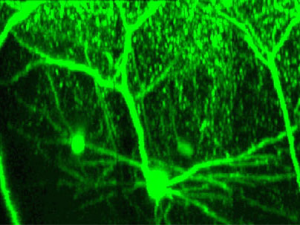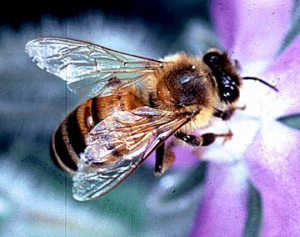It happens automatically and so quickly that most people probably never question the process of vision. Although it starts with the eyes, the majority of the work is performed in stages by cooperating layers of neural regions in the brain. As such, the underlying mechanism behind seeing and recognizing objects has long been of interest …
Category: Neuroscience
Jan 13 2006
Cilia Direct Newborn Adult Brain Cell Migration
Neuroscientists have never fully understood how new adult brain cells are able to traverse the relatively long distances they need to cover in order to reach their final locations within the brain. LiveScience.com is reporting today that a recent study of mouse brains co-authored by researchers at the University of California, San Francisco sheds some …
Jan 06 2006
Astrocytes Can Independently Control Blood Flow
Astrocytes, also known as astroglia, are star-shaped cells in the brain whose function and importance has never been fully understood by neuroscientists. Once thought to be housekeeping cells under the control of neurons, LiveScience.com is reporting today that researchers have found that astrocytes can directly and independently perform the critical function of controlling blood flow …
Jan 02 2006
Continuous Visual Guidance Important for Walking
A recent experiment by researchers from Great Britain finds that ongoing visual feedback during walking plays a more critical role than once thought. It was previously believed that vision was crucial only while lifting your foot to take a step and not as important once the target of your step was determined and your foot …
Dec 28 2005
Neuron Growth Occurs in Adult Brains
Researchers from the Picower Institute for Learning and Memory at MIT have recently found that contrary to popular belief, neurons do grow in mature brains. It had been widely accepted that structural remodeling of neurons does not occur in adult brains, but the discovery that it does could lead to advances in treatments of spinal …
Dec 22 2005
Scientists Can Predict Your Thoughts
Researchers from the University of Pennsylvania have done a study confirming a long held belief by most neuroscientists that during memory recall the brain “time travels” back to the state it was in when the memory was formed. As reporterd by LiveScience.com today, the scientists have found that by recording the brain activity of people …
Dec 20 2005
Retrograde Signal Strengthens Synapses
Researchers from MIT studying brain plasticity, the reorganization of brain cells and their connections over time, have recently discovered a “backtalk” or retrograde signal from post-synaptic to pre-synaptic neurons that plays a crucial role in synapse development. It has long been known that synaptic strength, the strength of the connections between neurons, plays a central …
Dec 13 2005
Mice With Human Brain Cells
It was announced yesterday that in an effort to create better models for studying neurological disorders, a team of scientists from the Salk Institute led by Dr. Fred Gage have successfully bio-engineered mice to be born with a small percentage of human brain cells. The process involves injecting 2-week-old mouse embryos with roughly 100,000 human …
Dec 12 2005
Honeybees Can Recognize Human Faces
World Science is reporting about a surprising discovery made by researchers from Johannes Gutenberg University in Mainz, Germany who have determined that honeybees can not only be taught to recognize human faces, but can also remember them for several days. The study re-opens a human neuroscience question thought by many to be already definitively answered …
Dec 04 2005
Neurons That Tune Out Background Noise
LiveScience.com is reporting that researchers from the University of Washington have discovered neurons in the brainstems of rats whose sole function is to identify new sounds while ignoring ongoing and predictable background noises. The scientists believe these specialized neurons are present in all vertebrates, including humans in whom they probably play a significant role in …



